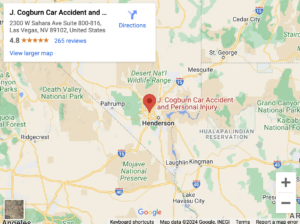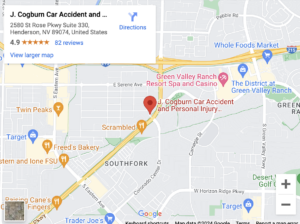
When someone else’s actions or negligence leads to your injury, it can be frustrating and overwhelming, especially when medical bills start piling up. Seeking compensation for your injuries can be a complex legal process. One of the most critical steps in your legal claim will be determining liability for the accident. Turn to a trusted legal advocate to help you understand your rights and pursue justice for your injuries.
In Nevada, personal injury liability falls under tort law. This legal field deals with civil wrongs that cause harm to others. When someone is injured in a car accident, workplace accident, or slip-and-fall accident, the law allows the injured person to seek legal remedy. There are three primary types of torts that can lead to personal injury claims:
- Negligence
- Intentional torts
- Strict Liability
Understanding the differences between these types of liability is crucial when pursuing compensation for your injuries. An experienced Nevada personal injury lawyer can assist you in determining the type of liability that might apply in your case.
Negligence in Nevada Personal Injury Cases

Negligence is the most common basis for personal injury claims. This occurs when one party fails to exercise a reasonable duty of care, causing harm to another person. Examples include:
- A property owner who fails to repair a hazardous sidewalk, leading to a slip-and-fall accident
- A driver who fails to stop at a red light and causes a collision
- An employer who fails to provide adequate safety measures in the workplace, resulting in injuries to employees
In these situations, the injured party must prove that the defendant’s negligence directly caused their injuries. Nevada follows a modified comparative negligence rule. This rule means that you can recover damages even if you are partially at fault for your injuries. As long as you are not more at fault than the other party for the accident, you can recover compensation. However, your compensation will be reduced by the percentage of your fault.
Intentional Torts in Nevada
Intentional torts occur when someone deliberately harms another person. While these cases can also involve criminal charges, personal injury claims are pursued in the civil system. Even when someone is facing criminal charges for harming you, it will not prevent you from seeking compensation in a civil court. Common intentional torts include:
- Assault and battery
- Defamation (slander or libel)
- Fraud
- Trespass
- Intentional infliction of emotional distress
In these cases, the injured party can seek compensation for both physical injuries and emotional distress caused by the defendant’s intentional actions. If you are harmed by the purposeful conduct of another person, you deserve to seek reasonable compensation for your damages.
Strict Liability in Nevada
Under the theory of strict liability, the defendant can be held responsible for an injury regardless of fault or intent. This is most commonly seen in product liability cases. A product liability case may involve a manufacturer being held liable for causing injuries stemming from a defective product. Strict liability also applies to inherently dangerous activities, like:
- Handling hazardous materials
- Keeping dangerous animals
In strict liability cases, the injured party must only prove that the defendant’s product or activity caused their injury. You do not need to prove they acted negligently or with intent to hurt you.
Common Types of Personal Injuries in Nevada
Personal injury claims in Nevada typically involve one or more of the following:
- Bodily Harm: physical injuries such as broken bones, spinal cord injuries, or traumatic brain injuries
- Pain and Suffering: compensation for the physical pain and emotional trauma caused by your injuries
- Emotional Distress: psychological harm caused by your injuries, such as anxiety, depression, or PTSD.
Make sure to work closely with an experienced attorney to determine the sorts of damages you are allowed to pursue.
Nevada’s Statute of Limitations for Personal Injury Claims
In Nevada, you have two years from the date of your injury to file a personal injury lawsuit. If you fail to take legal action within this time frame, you may lose your right to seek compensation through a lawsuit. It’s essential to act quickly to ensure that evidence is preserved and witnesses are available to support your case.
Why You Need an Experienced Attorney
Determining personal injury liability in Nevada can be challenging. It may be even more difficult when multiple parties are involved. Insurance companies will often try to minimize your recovery or shift blame onto you. Contact a Nevada personal injury lawyer from Cogburn Davidson Car Accident & Personal Injury Lawyers today to schedule a free consultation at 702-996-4786.


